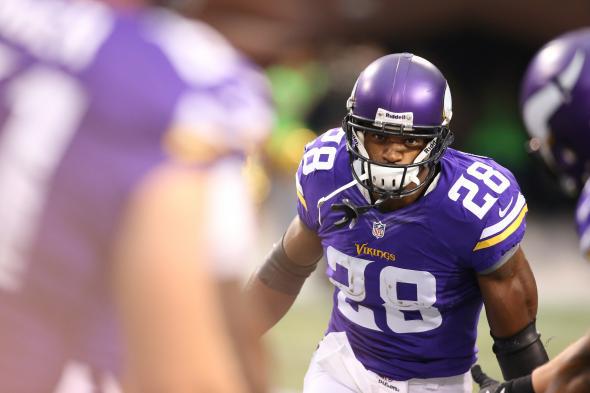The details, on their face, are inexcusable: Adrian Peterson, a 217-pound running back for the Minnesota Vikings, was indicted last week for “reckless or negligent injury to a child.” Peterson allegedly whipped his 4-year-old son with a stick, leaving bruises on his back, open wounds on his legs, cuts to his scrotum, defensive wounds on his hands, and perhaps more: “Daddy Peterson hit me in the face,” the child reportedly told authorities after doctors examined him and identified him as a victim of child abuse. In case the testimony of a 4-year-old kid and his doctors isn’t enough, there are pictures to prove that this was more than just a swat on the rear end. But proof is not the issue here. Peterson himself admits that he beat his child. His defense is that he beat him lovingly.
According to reporting by TMZ and others, Peterson sent a text message to the child’s mother after the beating that said: “Never do I go overboard! But all my kids will know, hey daddy has the biggie heart but don’t play no games when it comes to acting right.” Peterson’s lawyer, Rusty Hardin, stuck to the theme in a statement on the incident: “Adrian Peterson is a loving father who used his judgment as a parent to discipline his son.”
Reactions from around the NFL imply that “love” is a valid reason for beating a child. “I got a ass whippn at 5 with a switch that’s lasted about 40mins and couldn’t sit for 2days. It’s was all love though,” Arizona Cardinals defensive end Darnell Dockett tweeted in Peterson’s defense. Added New Orleans Saints running back Mark Ingram Jr.: “When I was kid I got so many whoopins I can’t even count! I love both my parents they just wanted me to be the best human possible!”*
But as former Vikings wide receiver and NFL Hall of Fame player Cris Carter has made clear, expressions of love and abusive activity are not mutually exclusive. “My mom did the best job she could do, raising seven kids by herself,” Carter said on ESPN’s NFL Countdown on Sunday. “But there are thousands of things that I have learned since then. … My mom was wrong. She did the best she could, but she was wrong about some of that stuff she taught me. And I promise my kids I won’t teach that mess to them.”
In cases of domestic abuse, violence and love don’t just exist under the same roof; they work in tandem. If Dockett and Ingram Jr. had come away with alternate conclusions about the motivations and fallout of their parents’ discipline—“It was all hate though”; “I hate both my parents”—they would not be defending Peterson today. Appealing to love allows abusers to maintain control over their victims far after they leave the home and serves to perpetuate the violence across generations. Few abusers are wholly evil people who openly hate their kids and seek to raise them exactly the wrong way. Those monsters are easier to recognize and convict, which makes so-called loving abusers in a way even more dangerous: After all, who would want to stop a man from loving his own children?
Even Nick Wright, who has submitted great reporting on this case for CBS Houston, nevertheless takes a kid-said, dad-said approach to the violence. “The child’s statement and Peterson’s recording phone call tell very different stories,” Wright wrote on Twitter this weekend. “The 4 yr old’s statement to the police is nothing short of horrifying and appalling and appear to show a scared child … Peterson’s statement sounds like it’s from a father who truly believe he’s done nothing wrong, loves his son & is sorry it went too far. … I truly believe Peterson loves and cares for his [son].”
Adrian Peterson and his child are not floating “different stories.” A frightened child suffering from abuse and a father who says he does it because he loves the kid are telling the same narrative. The fallacy here is so obvious that it has coalesced into a domestic violence cliché: “He hits me because he loves me.” Adrian Peterson’s claim that he did it for love is not a defense of his actions. It’s a warning sign that he continues to pose harm to his kids.
* Correction, Sept. 15, 2014: This post originally misstated that Mark Ingram plays for the New England Saints. There is no such team. He plays for the New Orleans Saints.
